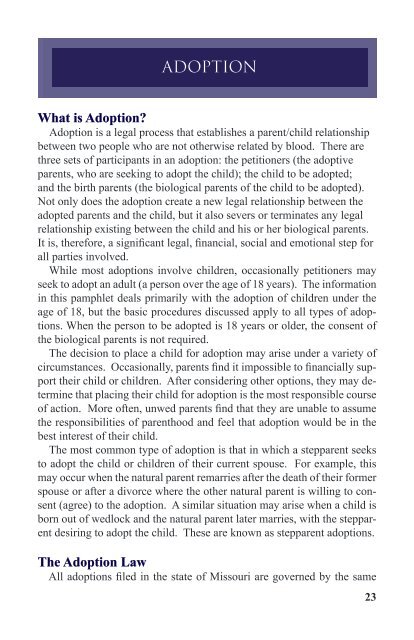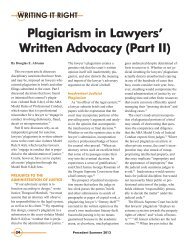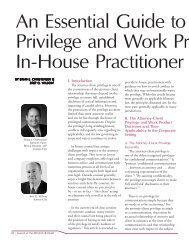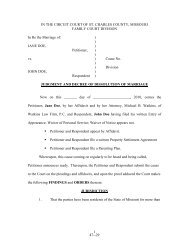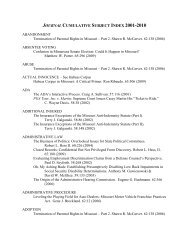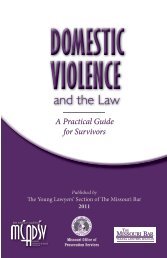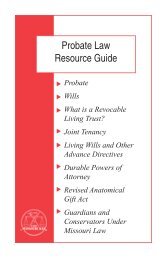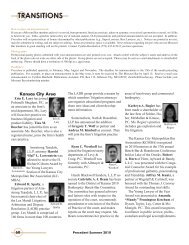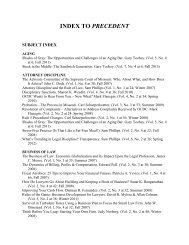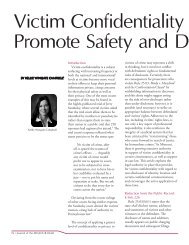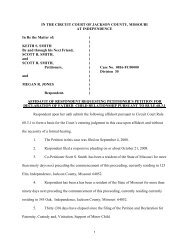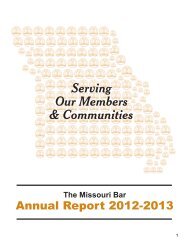Adoption - the Missouri Bar
Adoption - the Missouri Bar
Adoption - the Missouri Bar
You also want an ePaper? Increase the reach of your titles
YUMPU automatically turns print PDFs into web optimized ePapers that Google loves.
ADOPTIONWhat is <strong>Adoption</strong>?<strong>Adoption</strong> is a legal process that establishes a parent/child relationshipbetween two people who are not o<strong>the</strong>rwise related by blood. There arethree sets of participants in an adoption: <strong>the</strong> petitioners (<strong>the</strong> adoptiveparents, who are seeking to adopt <strong>the</strong> child); <strong>the</strong> child to be adopted;and <strong>the</strong> birth parents (<strong>the</strong> biological parents of <strong>the</strong> child to be adopted).Not only does <strong>the</strong> adoption create a new legal relationship between <strong>the</strong>adopted parents and <strong>the</strong> child, but it also severs or terminates any legalrelationship existing between <strong>the</strong> child and his or her biological parents.It is, <strong>the</strong>refore, a significant legal, financial, social and emotional step forall parties involved.While most adoptions involve children, occasionally petitioners mayseek to adopt an adult (a person over <strong>the</strong> age of 18 years). The informationin this pamphlet deals primarily with <strong>the</strong> adoption of children under <strong>the</strong>age of 18, but <strong>the</strong> basic procedures discussed apply to all types of adoptions.When <strong>the</strong> person to be adopted is 18 years or older, <strong>the</strong> consent of<strong>the</strong> biological parents is not required.The decision to place a child for adoption may arise under a variety ofcircumstances. Occasionally, parents find it impossible to financially support<strong>the</strong>ir child or children. After considering o<strong>the</strong>r options, <strong>the</strong>y may determinethat placing <strong>the</strong>ir child for adoption is <strong>the</strong> most responsible courseof action. More often, unwed parents find that <strong>the</strong>y are unable to assume<strong>the</strong> responsibilities of parenthood and feel that adoption would be in <strong>the</strong>best interest of <strong>the</strong>ir child.The most common type of adoption is that in which a stepparent seeksto adopt <strong>the</strong> child or children of <strong>the</strong>ir current spouse. For example, thismay occur when <strong>the</strong> natural parent remarries after <strong>the</strong> death of <strong>the</strong>ir formerspouse or after a divorce where <strong>the</strong> o<strong>the</strong>r natural parent is willing to consent(agree) to <strong>the</strong> adoption. A similar situation may arise when a child isborn out of wedlock and <strong>the</strong> natural parent later marries, with <strong>the</strong> stepparentdesiring to adopt <strong>the</strong> child. These are known as stepparent adoptions.The <strong>Adoption</strong> LawAll adoptions filed in <strong>the</strong> state of <strong>Missouri</strong> are governed by <strong>the</strong> same1123
asic set of laws (called “statutes”). However, procedures in differentcounties may vary slightly, due to differences in local rules and practice.Persons interested in adoption should seek <strong>the</strong> advice of an attorney whopractices in <strong>the</strong> county where <strong>the</strong> adoption is to be filed to ensure that localprocedures are followed. Failure to conform to <strong>the</strong> local law and proceduremay result in delays or, worse, in <strong>the</strong> court’s outright refusal to allow<strong>the</strong> adoption.Any person seeking to adopt must file a petition in <strong>the</strong> family or juvenilecourt. The petition may be filed in <strong>the</strong> county in which (1) <strong>the</strong> personseeking to adopt resides; (2) <strong>the</strong> child sought to be adopted was born; (3)<strong>the</strong> child is located at <strong>the</strong> time of filing of <strong>the</strong> petition; or (4) ei<strong>the</strong>r birthparent resides.It is generally <strong>the</strong> practice that married persons jointly seek permissionto adopt, although it is possible for individuals (whe<strong>the</strong>r married orunmarried) to petition <strong>the</strong> court. <strong>Missouri</strong> law requires that those seekingto adopt (petitioners) must be of good moral character and must possess<strong>the</strong> ability to care for, maintain and educate <strong>the</strong> child. The primary goalof each adoption proceeding is to promote <strong>the</strong> best interest and welfare of<strong>the</strong> child to be adopted.<strong>Missouri</strong> adoption law has a strong preference for protecting <strong>the</strong> privacyof <strong>the</strong> participants in <strong>the</strong> adoption process. Access to adoption records iscarefully restricted by state law in an effort to remove <strong>the</strong> process frompublic curiosity. In many circumstances, <strong>the</strong> biological parents and <strong>the</strong>adoptive parents may know each o<strong>the</strong>r’s identity. The law permits contactand communication between <strong>the</strong> biological parents and <strong>the</strong> adoptiveparents. This contact and communication is at <strong>the</strong> discretion of both <strong>the</strong>biological and adoptive parents prior to <strong>the</strong> adoption and after <strong>the</strong> adoptiononly at <strong>the</strong> discretion of <strong>the</strong> adoptive parents. Your attorney or adoptionagency will assist you in <strong>the</strong>se procedures.Even long after <strong>the</strong> adoption has been approved by <strong>the</strong> court, <strong>the</strong>re arelegal restrictions in <strong>Missouri</strong> on an adopted adult’s ability to seek informationregarding his or her biological parents. These procedures are ano<strong>the</strong>reffort to protect <strong>the</strong> identity of biological parents who have placed <strong>the</strong>irchild for adoption and may not wish to be tracked down by <strong>the</strong> child at alater date.Adult adoptees (age 21 and over) and biological parents or adult siblingsmay indicate <strong>the</strong>ir desire to be contacted by each o<strong>the</strong>r upon <strong>the</strong> voluntaryregistration of all parties with <strong>the</strong> adoption information registry. Toobtain a copy of an adoption information registry form, contact <strong>the</strong> Foster24
Adopt Hotline at (800) 554-2222 or online at dss.mo.gov/cd/adopt/adoir.A child may be placed for adoption by <strong>the</strong> child’s parents, <strong>the</strong> Children’sDivision (if <strong>the</strong> parental rights of <strong>the</strong> natural parents have beenterminated by court order), by a licensed adoption agency, or by anattorney, physician or clergyman. It is important to note that no transferof actual custody for <strong>the</strong> purpose of an adoption may take place withoutprior court approval. If such a transfer is accomplished without priorcourt approval, penalties may apply.The <strong>Adoption</strong> ProcessEach adoption is unique, but in <strong>Missouri</strong> most follow a similar process.A child may be placed for adoption by <strong>the</strong> child’s parents, <strong>the</strong> Children’sDivision, a licensed adoption agency, or by an attorney, physician or clergyman.No transfer of actual custody can take place without prior courtapproval. Also, before a child can be placed with adoptive parents, statelaw requires <strong>the</strong> adoptive parents to undergo a home study by a licensedsocial worker. State law also requires <strong>the</strong> birth parents and child to undergoassessments, which will be provided to <strong>the</strong> prospective parents.A birth parent may choose to relinquish parental rights, allowing <strong>the</strong>child to be adopted. If a birth parent chooses to consent to <strong>the</strong> adoption,<strong>Missouri</strong> law requires a child to be at least 48 hours old before a consentis considered valid. Once accepted by <strong>the</strong> court, <strong>the</strong> birth parent may notrevoke <strong>the</strong> consent.A birth parent may allow adoptive parents to pay certain expenses.There are strict regulations governing <strong>the</strong> types of expenses petitionersin an adoption proceeding can assume. Petitioners are only allowed topay certain expenses authorized by law or approved by <strong>the</strong> court. Theseexpenses may include: (1) medical expenses in connection with <strong>the</strong> birthor illness of <strong>the</strong> child; (2) counseling services for <strong>the</strong> biological parent orchild; (3) cost for <strong>the</strong> suitability and placement studies; (4) legal expenses,court costs, travel expenses, and administrative expenses: (5) reasonableliving expenses for <strong>the</strong> biological parents; (6) and any o<strong>the</strong>r services oritems that <strong>the</strong> court finds reasonably necessary. Petitioners will be requiredto disclose any and all fees <strong>the</strong>y have paid related to <strong>the</strong> adoption — calledan “accounting.” If <strong>the</strong> petitioners have paid any expenses not allowed bylaw or approved by <strong>the</strong> court, or if <strong>the</strong> fees paid are unreasonable, <strong>the</strong> courtmay not approve <strong>the</strong> adoption.If a birth parent does not consent to <strong>the</strong> adoption, adoptive parentswould have to prove <strong>the</strong> consent is not required because one of <strong>the</strong> fol-1125
lowing exists:1. The birth parent’s rights have previously been terminated;2. The birth parent has previously consented to <strong>the</strong> future adoptionof a child;3. The birth parent’s identity is unknown and cannot be ascertained;4. A man who has not been established as <strong>the</strong> fa<strong>the</strong>r denies paternity;5. After proper service, <strong>the</strong> birth parent is in default;6. The birth parent has a permanent and uncurable medical conditionthat renders <strong>the</strong> parent unable to provide care for <strong>the</strong> child; or7. The birth parent has, for a period of six months, abandoned orneglected <strong>the</strong> child who is one year of age or older (this period is60 days if a child is less than one year of age).If <strong>the</strong> person to be adopted is 14 years of age or older, his or her writtenconsent to <strong>the</strong> adoption is required.The adoption process under <strong>Missouri</strong> law is a two-step proceeding. Thefirst step involves <strong>the</strong> transfer of legal custody of <strong>the</strong> child to <strong>the</strong> adoptiveparents, and <strong>the</strong> second step is <strong>the</strong> actual adoption six months later. Once<strong>the</strong> petition for transfer of custody and adoption is filed, <strong>the</strong> juvenile courtappoints an attorney to act as guardian ad litem to represent <strong>the</strong> interest of<strong>the</strong> child who is to be adopted.Before <strong>the</strong> court enters a final decree of adoption, <strong>the</strong> adoptive parentsmust have had lawful and actual custody of <strong>the</strong> child for a period of at leastsix months. At <strong>the</strong> conclusion of <strong>the</strong> six-month period, a final adoptionhearing is held. At this hearing, <strong>the</strong> court determines whe<strong>the</strong>r it is fittingand proper that <strong>the</strong> adoption be allowed. Again, <strong>the</strong> social worker whoconducted <strong>the</strong> home study will be required to make a recommendation to<strong>the</strong> court. When <strong>the</strong> court finds that all legal requirements have been met,a judgment of adoption is entered. At this point <strong>the</strong> court’s involvementwith <strong>the</strong> family is concluded. For <strong>the</strong> purposes of a stepparent adoption,lawful custody is deemed to begin with <strong>the</strong> marriage of <strong>the</strong> parents. Theparents must be married for at least six months prior to <strong>the</strong> granting of <strong>the</strong>stepparent adoption.Once <strong>the</strong> final decree of adoption is entered by <strong>the</strong> court, <strong>the</strong> court clerksends to <strong>the</strong> Bureau of Vital Statistics of <strong>the</strong> Department of Health andSenior Services a Certificate of Decree of <strong>Adoption</strong>. Once <strong>the</strong> bureaureceives <strong>the</strong> certificate, <strong>the</strong> child’s original birth certificate is sealed and anew birth certificate is prepared, upon which <strong>the</strong> adoptive parents appearas <strong>the</strong> biological parents of <strong>the</strong> child.26
Legal ImplicationsWhen a child is adopted, all relations and rights between a child and itsbiological parents are terminated, and <strong>the</strong> child is viewed legally as if itwere <strong>the</strong> natural child of <strong>the</strong> adoptive parents. Specifically, <strong>the</strong> biologicalparents no longer have any rights to contact with or information about<strong>the</strong> child, although sometimes <strong>the</strong> adoptive parents will agree to maintainsome contact. Fur<strong>the</strong>r, <strong>the</strong> child has no right to inherit from his or herbiological parents. In a stepparent adoption, <strong>the</strong> grandparent (<strong>the</strong> parent of<strong>the</strong> non-adopting biological parent) may continue to have visitation rightseven after <strong>the</strong> adoption is granted.For Legal Advice, See Your LawyerIf you need help finding a lawyer, call The <strong>Missouri</strong> <strong>Bar</strong> Lawyer ReferralService at 573/636-3635.In St. Louis, call314/621-6681In Springfield, call417/831-27831127


